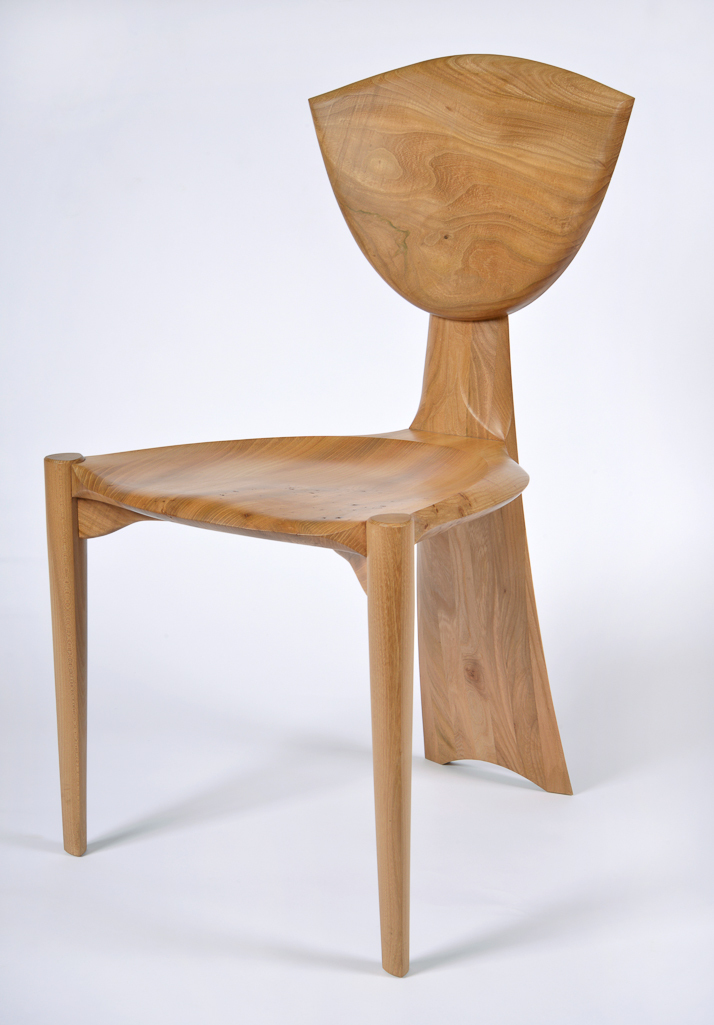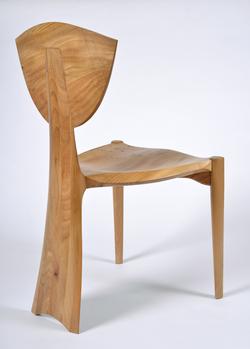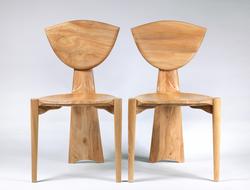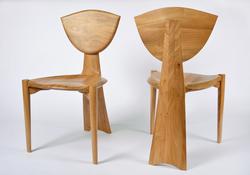Awaiting location update
Titles
Finback Chair
Maker(s)
Designer:
Burt, Matthew
Maker:
Boon, Ian
Workshop:
Albany Workshops
Entities
Categories
Description
Finback chair, elm (Ulmus procera), with one flat sloping back leg and two tricorn front legs.
Finback chair. Elm (Ulmus procera), sculpted using handheld power machines, followed by spokeshaves, files, scrapers, and finally hand held abrasive papers on blocks. The finish is two coats of beeswax. The seat is one piece of wood. The back leg is laminated vertically, and is held to the fin-shaped back support by an internally longitudinally tapering slot dovetail housing. The two front legs profiled into a tricorn cross section using a spindle moulder and holding jigs.The principal joints are internally positioned stainless steel threaded bars, resined into the timber. A pair with M.2-2005
Notes
History note: Purchased from the maker by the donors
Legal notes
Gift of Nicholas and Judith Goodison through the National Art Collections Fund
Measurements and weight
Height: 87.2 cm
Acquisition and important dates
Method of acquisition: Given
(2005-01-31)
by
Goodison, Nicholas and Judith
Dating
21st Century, Early
Elizabeth II
Production date:
AD 2004
Note
Text from object entry in A. Game (2016) ‘Contemporary British Crafts: The Goodison Gift to the Fitzwilliam Museum’. London: Philip Wilson Publishers: Matthew Burt studied Zoology and then Furniture-Making at Rycotewood College. He worked for a time as an apprentice to Richard Fyson (1917–2007) of Kencot, Oxfordshire before establishing his own workshop in 1979 in the Wylye Valley in Wiltshire. He was much influenced by the Arts and Crafts movement, Kencot being near Kelmscott, the home of William Morris (1834–96), and Sapperton where Ernest Barnsley (1863-1926), Sidney Barnsley (1865–1926) and Ernest Gimson (1864–1919) worked and inspired a generation of craftsmen. His business expanded and in 2013 he moved it to a larger purpose-built site in Hindon, in south-west Wiltshire, close to his village showroom. The site includes a dedicated design studio and well-equipped workshops, where with his wife Celia, the administrative director, he leads a team of designers, makers and apprentices. The business works largely to commission, creating free-standing and fitted furniture for private clients, museums, galleries, restaurants, cafes, pubs, business headquarters, churches and gardens. His visitors’ benches can be seen in the Ashmolean Museum, the Courtauld Gallery, the National Museum of Wales and the World Museum, Liverpool. The design and prototypes were developed by Matthew Burt between 2000 and 2003. This prototype was completed in 2001. Chairs can be made by any of the senior craftsmen in his workshop. Burt’s aims were to rely on the intrinsic strength of wood and do away with the traditional mortiseand- tenon support frame, to produce a comfortable sculpted form with economy of material. The seat is made of one piece of wood. During the design stage of the commission Burt lengthened and widened the fin back of the chairs to give it more presence in relation to the seat.
The design and prototypes were developed by Matthew Burt between 2000 and 2003, and can be made by any of the four craftsmen in his workshop, in this case Ian Boon
School or Style
Contemporary Craft
Components of the work
Joints
composed of
stainless steel
( threaded bars)
resin
( to secure)
Surface
composed of
beeswax
( two coats as a finish)
Seat
Depth 44.5 cm
Across Seat
Width 49 cm
Materials used in production
Ulmjus procera grown in Scotland and felled because it had died, due to Dutch elm disease
Elm
Techniques used in production
Carving
: Elm (Ulmus procera), sculpted using handheld power machines, followed by spokeshaves, files, scrapers, and finally hand held abrasive papers on blocks. The finish is two coats of beeswax.
Inscription or legends present
- Text: MADE\BY\IAN\BOON\2004
- Location: On bottom of back leg
- Method of creation: Written in black
- Type: Maker's mark
References and bibliographic entries
Identification numbers
Accession number: M.1-2005
Primary reference Number: 118398
Entry form number: 616
Stable URI
Audit data
Created: Saturday 6 August 2011
Updated: Tuesday 30 April 2024
Last processed: Tuesday 13 May 2025
Associated departments & institutions
Owner or interested party:
The Fitzwilliam Museum
Associated department:
Applied Arts







